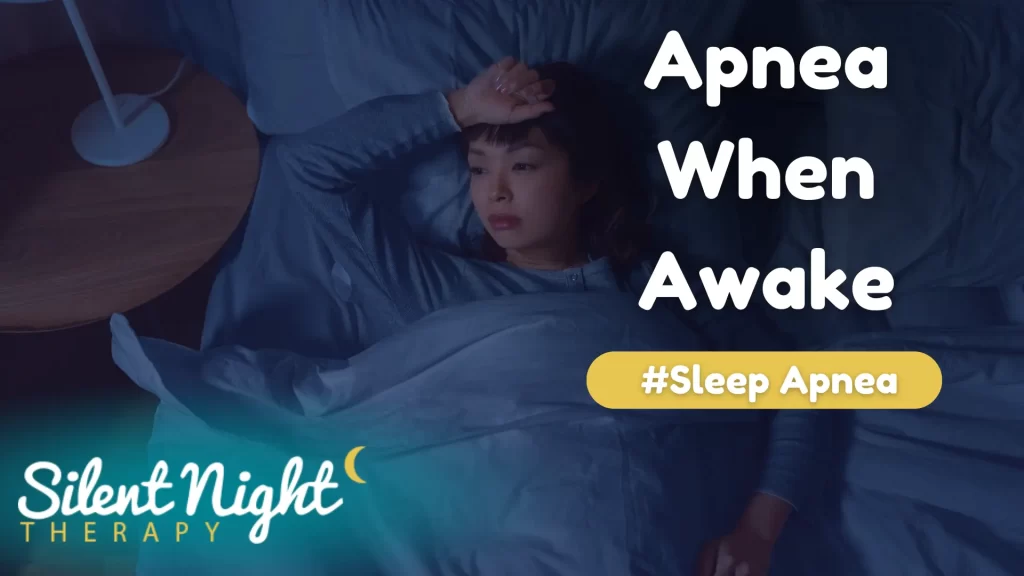Posted on Monday, April 1st, 2024 at 9:00 am
Sleep apnea is a condition involving prolonged moments where breathing stops during sleep. Often, breathing will begin again with loud gasping, choking, and snoring noises. This disorder is highly disruptive to sleeping patterns and can result in extreme fatigue during the waking hours. According to various sleep studies, sleep apnea may affect anywhere from 10 to 35 percent of adults at some point in their lives. What happens when you experience apnea when awake?
Apnea can also affect many individuals when they are awake. The experienced West Babylon sleep specialists at Silent Night Therapy have compiled the following guide to help you understand the causes and symptoms of awake apnea, as well as potential treatment options.
Understanding Apnea During Wakefulness
Apnea during wakefulness, also known as awake apnea or diurnal apnea, is a condition characterized by prolonged pauses in breathing while an individual is fully awake. These breathing interruptions can last several seconds to minutes and may occur often throughout the day. Although less common than sleep apnea, awake apnea can significantly impact an individual’s quality of life and overall health.
Causes and Symptoms of Awake Apnea
The causes can vary but often include underlying medical conditions such as chronic obstructive pulmonary disease (COPD), asthma, or neurological disorders affecting the brain’s ability to control breathing. Additionally, certain medications, obesity, and smoking can increase the risk of developing awake apnea.
Symptoms may include:
- Prolonged pauses in breathing during wakefulness
- Shortness of breath or difficulty breathing
- Excessive daytime sleepiness or fatigue
- Difficulty concentrating or staying focused
- Headaches
- Dizziness or lightheadedness
- Rapid heartbeat or palpitations
If you are experiencing these symptoms, you should see a licensed medical professional as soon as possible to avoid the most severe consequences and complications of awake apnea.
Potential Consequences and Complications of Awake Apnea
If left untreated, awake apnea can significantly impact an individual’s health and well-being. Some of the potential consequences include:
- Cardiovascular problems – Prolonged periods of oxygen deprivation can strain the cardiovascular system, raising the risk of heart disease, high blood pressure, and stroke.
- Cognitive impairment – Awake apnea can lead to decreased oxygen supply to the brain, which may result in cognitive impairment, difficulty concentrating, memory problems, and reduced mental alertness.
- Increased risk of accidents – Excessive daytime sleepiness and fatigue can increase the risk of accidents, particularly when driving or operating heavy machinery.
- Mood disorders – The persistent lack of quality sleep and oxygen deprivation can help provoke the development of mood disorders such as anxiety and depression.
- Weakened immune system – Chronic oxygen deprivation and sleep disturbances can depress the immune system, making individuals more susceptible to infections and illnesses.
- Decreased quality of life – The combined effects of fatigue, cognitive impairment, and other symptoms of awake apnea can significantly reduce an individual’s overall quality of life, limiting their ability to perform daily tasks, maintain social relationships, and engage in activities they enjoy.
Given how severe these consequences could be, it is crucial for individuals experiencing symptoms of awake apnea to seek prompt medical attention and appropriate treatment to take control of the condition and prevent long-term complications.
Treatment Options for Awake Apnea
Treatment for awake apnea depends on the underlying cause and severity of the condition. Some potential treatment options include:
- Addressing underlying medical conditions – If an underlying condition such as COPD or asthma is causing awake apnea, treating these conditions may help alleviate symptoms.
- Lifestyle changes – Losing weight, quitting smoking, and maintaining a healthy diet and exercise routine can help improve overall respiratory health and reduce the risk of awake apnea.
- Breathing exercises – Practicing breathing techniques, such as pursed-lip or diaphragmatic breathing, can help improve lung function and alleviate symptoms of awake apnea.
- Medications – In some cases, bronchodilators or corticosteroids may be prescribed to help manage symptoms and improve breathing.
- Oxygen therapy – For individuals with severe awake apnea or underlying respiratory conditions, supplemental oxygen therapy might be necessary to ensure adequate oxygen levels in the body.
Contact Silent Night Therapy Today
If you or a loved one is experiencing awake apnea, seeking treatment from a licensed professional is essential. Breathing issues can be highly disruptive and potentially life-threatening. The experienced West Babylon sleep specialists at Silent Night Therapy have extensive experience helping individuals with their apnea-related issues. With us on your side, you can optimize your chances of getting your health back on track. Call us today at 631-983-2463 or contact us via our online form to learn more about how we can assist you.

